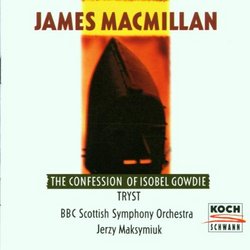| All Artists: James MacMillan, Jerzy Maksymiuk, BBC Scottish Symphony Orchestra Title: James MacMillan - Confessions of Isobel Gowdie / Tryst (Koch) Members Wishing: 0 Total Copies: 0 Label: Koch Release Date: 9/15/1994 Genres: International Music, Classical Styles: Historical Periods, Modern, 20th, & 21st Century Number of Discs: 1 SwapaCD Credits: 1 UPC: 099923105022 |
Search - James MacMillan, Jerzy Maksymiuk, BBC Scottish Symphony Orchestra :: James MacMillan - Confessions of Isobel Gowdie / Tryst (Koch)
 | James MacMillan, Jerzy Maksymiuk, BBC Scottish Symphony Orchestra James MacMillan - Confessions of Isobel Gowdie / Tryst (Koch) Genres: International Music, Classical
|
Larger Image |
CD DetailsSimilar CDs |
CD Reviews...Promising start David | Spruce Grove, AB Canada | 08/08/2002 (4 out of 5 stars) "This extraordinary work from one of Britian's most promising composers had a unlikely start in it's premeir. It was placed between Beethoven's Fourth Symphony and Sibelius Violin Concerto at the London Promenade Concert 1990. It seemed like an odd choice giving the reasons that "The Confessions Of Isobel Gowdie" had only been written the previous year and very little had been known of James Macmillan at that point. Isobel Gowdie scored a triumph for MacMillan, the impact on the audience was far wider than expected."The Confession Of Isobel Gowdie" draws its inspiration on the 1662 execution of Isobel Gowdie, who had confessed herself into being a witch after being undescribable tortured. This was the time of the English Reformation and witch hunting was a daily occurrence, executions were cheered on. The reasons for a conviction could be something totally absurd. "The Confessions of Isobel Gowdie" has a Stravinsky "The Rite Of Spring" approach that begins slowly than escalates into a sudden burst of energy. The whole work is divided into musical quotes, a Scottish ballad (The Cruel Mother), a Gregorian chant (Lux aeterna). The Lux aeterna section of the work intensifies with trombones and percussions that become quite erratic, the illusion of ritual barbarism is conjured up.Tryst, a longer work but smaller in scale was written the year before, 1989. It grew from life out of a violin and piano composition called "After The Tryst" based upon William Sontar's love poem. It is again one continous movement broken up in five sections which center upon faith, love and hope. The musical pattern is much the same as "The Confession Of Isobel Gowdie" swirling winds of sounds that cascade into unformular territory, a territory that draws you into a magnetic field. Tryst begins violently that transends into a slow mediation in the middle and back again to being violent at the end. "The Confession Of Isobel Gowdie/ Tryst" on the Koch label was conducted by Jerzy Maksymiuk with the BBC Scottish Orchestra, the same very person and orchestra that performed "The Confession Of Isobel Gowdie" at the London Promenade. One major problem I had with the disc, not so much with the performance or the music itself...is that Koch elected to leave each work as single tracks, two tracks in total and not clearly divide the works up into their respected sections as they were intended for. James Macmillan may appear to some as new music and a bit of a challenge, "The Confession Of Isobel Gowdie/Tryst" to me is his easiest to listen to, your transported into a dark age that as a whole the music is supposingly representing."
|

 Track Listings (2) - Disc #1
Track Listings (2) - Disc #1